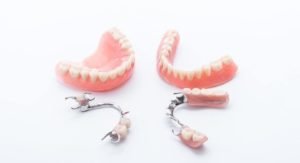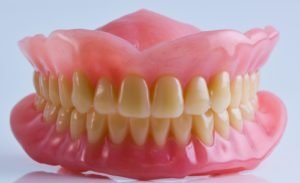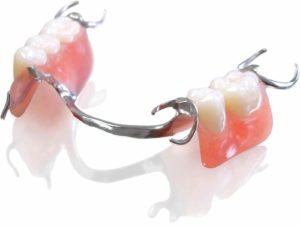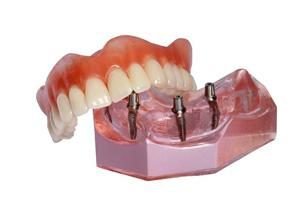Dentures are used as a replacement of missing teeth that can be taken out and put back into your mouth. They are custom made according to your teeth structure. While dentures take some getting used to, and will never feel exactly the same as one’s natural teeth, today’s dentures are natural looking and more comfortable than ever. They are removable in nature i.e. they can be taken out of the mouth while eating and sleeping and can be put back again.
Dentures
What is Dentures?

- Dentures are a good solution for missing teeth as they help to improve the appearance and smile. They support the facial muscles and prevent them from sagging and make you look younger. Missing teeth can lead to speech impairment and it also makes chewing difficult. Dentures are the solution to all these problems.
- Types of Dentures:

Full dentures consist of both upper and lower sets, it is placed in your mouth after all remaining teeth are removed and tissues have healed. With proper care and maintenance, full dentures can last anywhere from 5–10 years.

Partial dentures are recommended if only a few of your teeth are missing. They also help keep your remaining teeth from shifting. Partial denture rests on a metal framework that attaches to your natural teeth

Implant dentures can be either partial or full tooth replacement prosthetics. Prior to placement, they closely resemble removable dentures. However, these tooth replacement prosthetics are attached to dental implant posts that mimic natural root structures holding your denture in place.

We provide patients with temporary dentures while they are undergoing a cosmetic dentistry procedure to replace a missing tooth. While waiting for dental implants or a dental bridge to be completed. This is an excellent solution for when a tooth is knocked out during a sports game or in an accident. The temporary denture is secured in place with a metal wire that works like a retainer and can be taken in and out whenever you like. A temporary denture is only meant to be worn for a few months and will need to be replaced.
Frequently asked questions:
How Long Before I Get Used to My Dentures?
New dentures may feel awkward or uncomfortable for the first few weeks or even months. Eating and speaking with dentures might take a little practice. A bulky or loose feeling is not uncommon, while the muscles of your cheeks and tongue learn to hold your dentures in place. Excessive saliva flow, a feeling that the tongue does not have adequate room, and minor irritation or soreness is also not unusual.
Can I sleep in my dentures?
Yes, you can wear your dentures at night but it is preferred that they are removed. You should remove your dentures at night and this will give your gums and bone a chance to relax from the pressure of the denture during the day. If you need to wear your dentures for social reasons or to prevent your jaws from over closing, you should find time during the day to properly clean your mouth and your prostheses. You should never wear your dentures 24 hours a day without performing proper oral hygiene. Dentures should be cleaned at night and stored in water during the night.
How will dentures affect my eating?
Adjusting to dentures takes time and patience, but you’ll get used to them before you know it. We explain best ways to get used to biting and chewing with your new dentures.
Will dentures affect the way I speak?
Getting dentures for the first time is an adjustment, to say the least. You may experience some lisping at first, but it shouldn’t take long to re-teach your tongue and lips where they go to regain your original speech patterns.
Will my denture need adjusting?
Over time, adjusting the denture may be necessary. As you age, your mouth naturally changes, which can affect the fit of the denture. Your bone and gum ridges can recede or shrink, resulting in a loose-fitting denture. Dentures that do not fit properly should be adjusted by your Dentist. Loose dentures can cause various problems, including sores or infections. See your Dentist promptly if your denture becomes loose.
How long do Dentures Last?
Over a period of time, your denture will need to be relined, remade, or rebased due to normal wear. Rebasing means making a new base while keeping the existing denture teeth. Also, as you age, your mouth naturally changes. These changes cause your dentures to loosen, making chewing difficult and irritating your gums. You should visit your dentist annually for a check-up.
Here are tips for caring for your dentures:
- When handling your dentures, stand over a folded towel or basin of water. Dentures are delicate and may break if dropped.
- Don’t let your dentures dry out. Place them in a denture cleanser soaking solution or in plain water when you’re not wearing them. Never use hot water, which can cause them to warp.
- Brushing your dentures daily will remove food deposits and plaque, and help prevent them from becoming stained. An ultrasonic cleaner may be used to care for your dentures, but it does not replace a thorough daily brushing.
- Brush your gums, tongue, and palate every morning with a soft-bristled brush before you insert your dentures. This stimulates circulation in your tissues and helps remove plaque.
- Visit your dentist if your dentures break, chip, crack or become loose. Don’t be tempted to adjust them yourself — this can damage them beyond repair.

